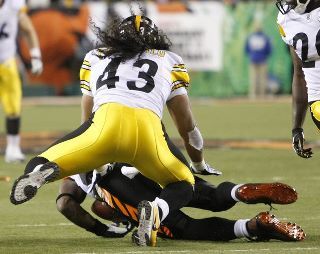Post by misty on Jun 30, 2007 23:37:36 GMT -5
Many persons with ADHD find themselves playing the Blame game. This can work either way. In other words we can blame everyone else for our ongoing problems or on the other hand we can blame ourselves for everything that goes wrong. The truth usually lies in the middle and the key is to realize when we are doing it.
It seems that too often we are at one end of the extreme on this or the other. Neither one is healthy for us or those close to us.
I have a tendency to blame myself for all my problems and discount anyone else having any impact on things. Many times I am right about this but often after considerable thought I can see where others may have at least played a role in what happened. Not that it does any real good for me to try and parcel out the blame. It seems too easy for me to just accept it and try and move on. Sometimes it causes me to hyper focus too much on my role in the matter. This leads to guilt, self defeating thoughts and past history of problems I created for myself.
Others with ADHD seem to always be looking to blame others for things that go wrong. They get easily defensive. They take things personally and can change a minor comment received into a major issue by denying responsibility, arguing, trying to come up with an incident from the past that the person who made the comment did the same thing. They at time seem unable to accept any responsibility for their own actions. Since many of these people find themselves in conflict with others on a regular basis they can become almost paranoid about everyone being out to get them. Often times once they have calmed down they come to the realization that they had blown things out of proportion and in reflecting back acknowledge to themselves their role in the incident. Sometimes having blown their top earlier makes it difficult to go back and apologize to someone else or even discuss it in a calm way.
Being on the end of criticism or perceived criticism is very common for us as we have experienced this since childhood. Many times what we said or did was totally misunderstood by others and we tried to explain what we meant only to make the situation even worse. Then when we actually have done something wrong we find ourselves conditioned to try to immediately deny or diminish our role in the situation. These conditioned reflex statements are closely related to our tendency to say what's on our mind as soon as it enters our head. You have probably all been in the situation of wishing you could grab the words that were coming out of your mouth even before you finished saying what it was you were saying. But it's too late and the cats out of the bag. Then we face the consequences of our impulsiveness.
In order to improve in this area it is best that we focus when we think something said to us was out of line. Try and delay an immediate response. In other words be quiet and try and calm down. We have two ears to listen with and one mouth to speak with so use the ears to absorb what was said and get a 3 second delay in place to decide whether this is a battle worth fighting. If it can be put off till later than by all means do so. If it can be put off forever that's even better.
If we have been the one who said the statement that is in dispute than again we need to assess the situation calmly and decide whether an apology is in order. If it is make it very short and then leave the other person alone for awhile. If it needs some more attention you can come back to it later and revisit the matter with them. Too many times our apologies are too long and drawn out and actually make matters worse. Many of us become almost obnoxious in trying to smooth things over. Believe me the less you say now, the less you will have to apologize for later. I have been there so I know.
When you find yourself playing the blame game whichever side of the issue you feel you are on the best advice is to STOP and give the matter a lot of thought. This will result in less self blaming and less apologizing. That can't help but have a more positive long range outcome
If you know on anyone who might like this newsletter please forward it to them and tell them to go to my web site at www.addcorridorcoaching.com and sign up.
It seems that too often we are at one end of the extreme on this or the other. Neither one is healthy for us or those close to us.
I have a tendency to blame myself for all my problems and discount anyone else having any impact on things. Many times I am right about this but often after considerable thought I can see where others may have at least played a role in what happened. Not that it does any real good for me to try and parcel out the blame. It seems too easy for me to just accept it and try and move on. Sometimes it causes me to hyper focus too much on my role in the matter. This leads to guilt, self defeating thoughts and past history of problems I created for myself.
Others with ADHD seem to always be looking to blame others for things that go wrong. They get easily defensive. They take things personally and can change a minor comment received into a major issue by denying responsibility, arguing, trying to come up with an incident from the past that the person who made the comment did the same thing. They at time seem unable to accept any responsibility for their own actions. Since many of these people find themselves in conflict with others on a regular basis they can become almost paranoid about everyone being out to get them. Often times once they have calmed down they come to the realization that they had blown things out of proportion and in reflecting back acknowledge to themselves their role in the incident. Sometimes having blown their top earlier makes it difficult to go back and apologize to someone else or even discuss it in a calm way.
Being on the end of criticism or perceived criticism is very common for us as we have experienced this since childhood. Many times what we said or did was totally misunderstood by others and we tried to explain what we meant only to make the situation even worse. Then when we actually have done something wrong we find ourselves conditioned to try to immediately deny or diminish our role in the situation. These conditioned reflex statements are closely related to our tendency to say what's on our mind as soon as it enters our head. You have probably all been in the situation of wishing you could grab the words that were coming out of your mouth even before you finished saying what it was you were saying. But it's too late and the cats out of the bag. Then we face the consequences of our impulsiveness.
In order to improve in this area it is best that we focus when we think something said to us was out of line. Try and delay an immediate response. In other words be quiet and try and calm down. We have two ears to listen with and one mouth to speak with so use the ears to absorb what was said and get a 3 second delay in place to decide whether this is a battle worth fighting. If it can be put off till later than by all means do so. If it can be put off forever that's even better.
If we have been the one who said the statement that is in dispute than again we need to assess the situation calmly and decide whether an apology is in order. If it is make it very short and then leave the other person alone for awhile. If it needs some more attention you can come back to it later and revisit the matter with them. Too many times our apologies are too long and drawn out and actually make matters worse. Many of us become almost obnoxious in trying to smooth things over. Believe me the less you say now, the less you will have to apologize for later. I have been there so I know.
When you find yourself playing the blame game whichever side of the issue you feel you are on the best advice is to STOP and give the matter a lot of thought. This will result in less self blaming and less apologizing. That can't help but have a more positive long range outcome
If you know on anyone who might like this newsletter please forward it to them and tell them to go to my web site at www.addcorridorcoaching.com and sign up.














